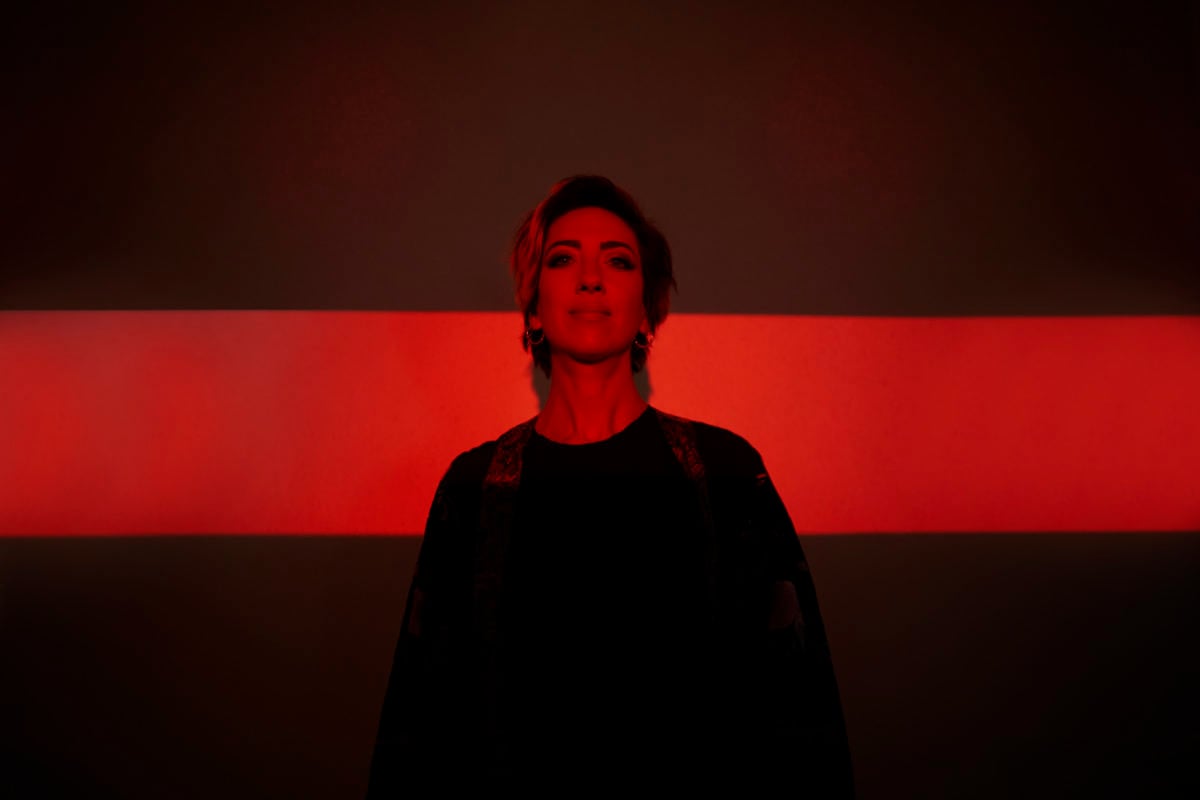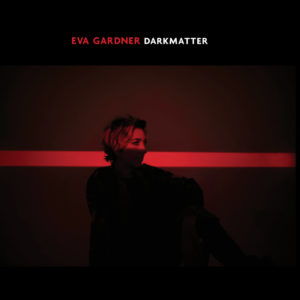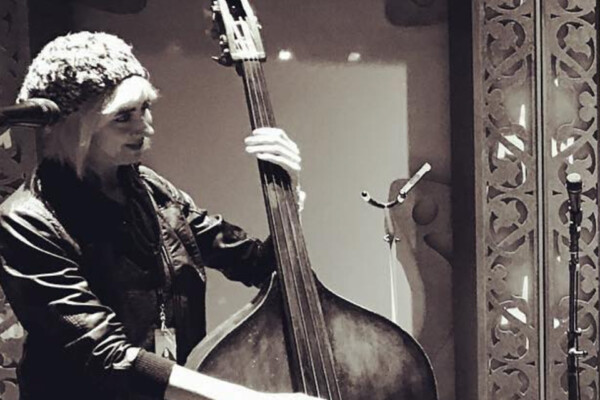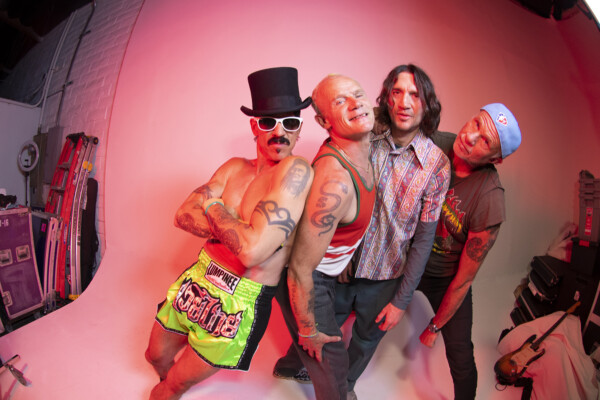Darkmatter: An Interview with Eva Gardner

Eva Gardner has returned with her second solo EP, entitled Darkmatter. Although she’s known for her killer bass playing, the record showcases her songwriting talents as well as her vocals, keys, and guitar work in a sweet blend of 90s grunge with a modern pop twist.
Her father, Kim Gardner, was a bass player in the revolutionary British rock scene of the ’60s and ’70s. He would move to L.A. and eventually open the Cat & Fiddle, which has been a staple for Hollywood rockers. Eva eventually made her own way to the bass and became the first bassist in The Mars Volta. Since then, she’s toured with artists like Cher, Tegan & Sara, Moby, Gwen Stefani, Veruca Salt, and more. Gardner has been in Pink’s touring band for the past 14 years.
We caught up with Gardner to get the scoop on the new album, her creative process, and growing up around rock stars.
Darkmatter is available now on CD and vinyl through Gardner’s website.
Your new album is called “Darkmatter”. Did you write this from a dark place?
 Yes and no. When I’m in a productive mode, I have to come from a happier place where I’m feeling inspired and motivated, and energized. I’m usually most productive when I’m in that zone, but there will be times that… I keep running notes on my phone of brain dumps. If I’m feeling something or a certain way, I’ll just put that all down and it will be fodder for when I’m ready to turn it into something.
Yes and no. When I’m in a productive mode, I have to come from a happier place where I’m feeling inspired and motivated, and energized. I’m usually most productive when I’m in that zone, but there will be times that… I keep running notes on my phone of brain dumps. If I’m feeling something or a certain way, I’ll just put that all down and it will be fodder for when I’m ready to turn it into something.
It’s both things – coming from experiences that aren’t so pleasant, but they’re developed when I’m ready to power up and plug in.
Lyrically, some of it sounded dark and I wasn’t sure how much I was putting it on myself.
I think a lot of artists do that purposefully, where they leave things open to interpretation and people can adapt and place whatever relevance on it that they want.
I understand it’s also a reference to your early fascination with astronomy.
Yeah, my dad had a telescope when I was little and one of our favorite things to do was get it out with the book of space to see what things we could find in the night sky. I just thought it was the coolest thing that I could see the craters in the moon. I grew up in Hollywood, so I was always close to the Griffith Observatory. Griffith Park was a regular place for us to go to and the observatory was always up there for us. We’d go hang out at the planetarium during high school and hang out. It was always a big presence for me. It’s ironic, because growing up in Los Angeles, we didn’t have much of a night sky. We can see the really bright prominent constellations, but being so into space as a kid it’s funny I didn’t see more.
What was the timeline of the creation for Darkmatter?
I started a couple of these songs about five years ago just as sketches with guitar and vocals. I tucked them away, always wanting to get back to it but other things got in the way. Some of the stuff I worked on while on the road because I travel with a recording rig. Last year, I was in a music production course. I needed to create material so I could mix it for them so they could give me feedback. I thought, “Cool, I’ll take some of these old ideas, build them up, and have something to turn in.” It was great because it forced me to finish the songs and actually produce it.
Also, part of the course was how to start from the very beginning, including tactics as to how to approach songwriting. Do you write it before you start recording or record as you go, and so on? That forced me to create new material.
This course was great because it actually gave me some goals to work towards. I had taken another songwriting course before and one of the big takeaways from that is to finish your ideas. You can have sketches all over the place and never have a finished idea. One of the things I’ve taken from that is really implementing finishing. Even if it’s a piece of crap, it’s ok. Edit later and fix it later, just have something to show.
What prompted you to take that course?
I had a little more time on my hands last year and I decided that since I wasn’t out on the road I wanted to delve a little deeper into something I was already doing. My tactic up until then had just been demoing. I wanted to get ideas in the box so I had them and let someone else make them sound good. I also started creating music for ad campaigns and writing to visual cues for commercials. When you’re doing that, you have to be self-contained. I have to record it, mix it, and master it myself. With all those things combined, I just decided I wanted to get better at knowing the technical side and making things sound good so I have something that I’m ok with presenting. I don’t want to wait on people to mix for me, especially when working on commercials. They want the music back that night. You’re forced to figure it out. It happens quickly. Everyone was so self-contained last year, anyways. No one was going out or doing that; it was all insular. For all those reasons, I decided it was time to up my game. I still have a lot to learn, but I’m getting there!
You did a lot of the recording on your own, but you still went to Norman, Oklahoma to record at a studio.
I had 12 songs and I was talking to my friend, Josh Berwanger, who ended up producing it about wanting to get an outside perspective. Again, everything was so insular last year. You can’t get a good sense of your ideas when you’re just in your headphones all day long.
I sent the stuff to him and said, “I want to do an EP.” He helped me pick out five songs for it. I had worked with him at this studio in Oklahoma before for his record. I said, “Since I’m already familiar with these guys, let’s get this team back together to work on this.”
For my demos, I was doing programmed drums. I wanted live drums, so we got those done there. I got some better vocals with better mics, some live piano… Just things to give the music more of a vibe. He had a ton of great analog gear so we used it to warm everything up. Then I had him mix and master it.
Did you change the bass much after you had already made the demos?
Some of it I kept and some I retracked over there because we reimagined some of the songs. “High Moon” got that treatment and we tracked it live. That was the first time I had played with a drummer at the same time in a year. We were in the studio and jamming on “High Moon” when I realized, “Oh wow, I’m playing with a drummer again!” It was the most amazing feeling. We had Jared, the engineer, playing guitar.
That must have been crazy.
It was super crazy. It was weird to realize I hadn’t played with other musicians in that long and how you can take that for granted. It felt like an out-of-body experience. There’s so much perspective now.
“High Moon” has some pretty gnarly bass sounds on it.
It’s actually double-tracked on one of the parts. I’m using a Mustang for the main parts and when I got into the weird interlude part I have another distorted bass. It was something that I did at home. I can’t remember exactly what I was running through but it was some raunchy effect.
When you were making this album, did you feel like you had to step out of the bass player role or do you just think of yourself as a songwriter first?
In everyday life, I’m always a bass player first. Something shifts when I put the songwriting hat on and I have a completely different process. I don’t even start with the bass a lot of the time. There’s only one song that started with the bass, and that’s “Anywhere But Here”. Everything else started out as a guitar idea, a synth idea, lyrics, a melody… I’m coming at it more from the overall song than the bass lines.
Although, the next batch of songs I’m writing are going to start with the bass and see what happens. I have one in the works already.
When song ideas come to me or lyric ideas, they’re always a melody or sometimes it’s even a drum loop. It always varies, but it’s not like “I’m a bass player and I’m going to write a song.” It comes from a different place. It’s weird because it feels like wearing a different hat.
I guess in a way it’s still a bass player mentality since the function is typically to put the song first, as opposed to sliding in cool riffs and flashy stuff. Playing for other people, I’m guessing you have to censor yourself sometimes.
It’s funny you say that because I’ve had conversations with other bass players where we ask, “How many times have you been asked to ‘just play the part?’” [laughs] It’s the whole less is more thing. Especially when you’re in a hired gun position, you’re there to support whoever you’re playing with. I think there was one time I had a bass solo on stage in the last ten years of shows, and that was when we did a cover of “My Generation.” It was really fun, but I can’t even remember when there was another place for me to step out. It is what it is, but when they chose that song I was like, “Sweet, a little Entwistle vibe.”
There was one show where, hilariously, the guitar player played over me. [laughs] He said, “Oh, shoot! Sorry!” It’s like, you’ve had the whole set and this is my ten seconds.
You’ve mentioned before that your sound mixes grunge and pop from your youth. Who were the bands that helped form your musical identity?
When I first started playing, I was listening to Nirvana, Hole, Smashing Pumpkins, Veruca Salt, Stone Temple Pilots, Pearl Jam, and that whole sound that was happening in the early ’90s.
Were you aware of the bass players from those bands since your father was a bassist?
I was totally conscious of the bass players. Interestingly enough, the formula for me becoming a bass player was being told no. I just wanted to play bass like my dad. I was hearing all his stories of being on tour with The Who and The Rolling Stones. He was in his first band with Ron Wood and he recorded with Eric Clapton and George Harrison. He was part of this really precious moment in musical history in London during the ’60s. Growing up and hearing all of those stories, I knew that’s what I wanted to do. It sounded amazing.
He was not that into the idea. I’m sure there were a lot of reasons why, but all I know is that I was told no, so it made me want to do it even more.
I had to figure it out. He wouldn’t buy me a bass, so I had to borrow basses for a long time. I took it upon myself to make it happen. It wasn’t even my dad who gave me my first bass lesson. It was my dad’s best friend, Andy Johns, who is a producer and engineer from that same time period. It was the people that were around that were encouraging me. When I showed my dad that there was no turning back and it was what I wanted to do, he finally realized I was serious.
Then it was great father/daughter time where he would take apart a bass and show me how to do all this stuff. That was priceless, but it took a long time to get there. It took me working for it and looking back, I’m glad I was told no because it made me realize that was what I actually wanted to do. It wasn’t forced on me.
Was he still playing around that time? He had opened The Cat & Fiddle by that time, correct?
That’s right. He moved to L.A. and there wasn’t an English pub to drink at in Hollywood, so he opened one. It was a place for him and all of his rock and roll buddies to hang out. He was still touring the first few years of my life. When my mom was pregnant with my twin sisters, he opened up the pub and stopped touring. He did play around town and he also had a jazz band every Sunday night at the pub that he would sit in with. He played “All Blues” every Sunday for twenty years.
Were you into his music when you were growing up? I was listening to Ashton, Gardner & Dyke, and that stuff is pretty hip.
They were super hip. That was 1969 that they got together and my dad took the frets off his bass. He had a 1962 Fiesta Red Precision that he used in The Creation. He tore off the frets in ’68 and painted it black. It was probably one of the first fretless electric basses. He was a big jazz head. That was the influence he brought into Ashton, Gardner & Dyke that made it ahead of its time, in a way.
I was his biggest fan. My dad was my hero. I adored him and wanted to be like him and do what he did. In high school, I was doing reports on his band. I was super stoked on it.
He told me stories that he jammed with Jimi Hendrix one time because he was friends with Mitch Mitchell. It was the scene, you know? I was super into Hendrix during high school. Interestingly, a lot of the characters who were around when I was a kid, I never really appreciated who they were at the time. I look back now and think, “Oh.” There was a time that Mick Taylor was over and playing guitar in the studio with him. To me, it was like, “Here’s another one of my dad’s cooky friends!” John Entwistle lived down the street from us, so he was around.
It wasn’t later until I realized what these people mean to music. I feel blessed that I got to even breathe the same air as those guys.
Some of those characters must have been partying down. Was it chaotic in your house?
Uhhhh, that’s putting it lightly. [laughs] I was talking to a kid I grew up with and I said, “We didn’t have normal childhoods, did we?” He said, “No, I don’t think we did.”
I literally grew up in a bar surrounded by crazy rock and rollers. It was the “sex, drugs, and rock and roll” era people. There were a lot of characters doing crazy stuff. Considering that, my sisters and I had a really well-adjusted childhood. People think Hollywood is a terrible place to raise kids, but I had the best childhood. Showing interest in music, one of my first gigs was at The Whiskey. There were places to play at and other people to play with. We had access to resources and other people that were into music. I loved growing up here.

Switching gears back to your creative process, do you have any tips for workflow? If you’re managing to write and record while you’re on the road, you must have some set of best practices.
One of the biggest tips for me is making a habit. I read this great book called Daily Rituals: How Artists Work by Mason Currey. It’s about the habits of everyone from Chopin to Dali and how they work. One quote I really loved was something to the effect of “I only create when inspiration strikes. It just so happens that inspiration strikes at 9 AM every morning.”
You can’t just wait around to be inspired. It’s like working a muscle. When you sit down at 9 AM or whatever time, your brain sets off into the gear for when you create. It can work for anything. Even if you don’t get anything done that day, so to speak, you’re working that muscle. You train your brain and the ideas flow easier eventually. It’s like going to the gym. That’s when the pathways open.
Another one that I really liked that I mentioned earlier is just finishing ideas. Even if you think it’s complete crap, just finish it and you can edit later. Don’t edit as you go. I was writing an essay recently and someone told me about a feature on Microsoft Word where the delete key doesn’t work. You can’t fix anything, you just have to write, write, write, write, write. That’s been a helpful tactic, too. Don’t listen to that little voice that wants to edit everything.
What else do you have coming up? Any touring with Pink on the horizon?
Probably not until next year. The word is next summer, perhaps, but that’s the latest that we’ve gotten. In the meantime, I’m continuing to take advantage of this time that I have to continue being a music student, continue being a music production student, and continue creating.
I’m making sure to invest in myself now with what I’ve got. Shifting the perspective and seeing this time as a blessing instead of a curse [is important]. You can’t control the circumstances, you can only control how you react to it. We have to keep that in mind and be grateful.



